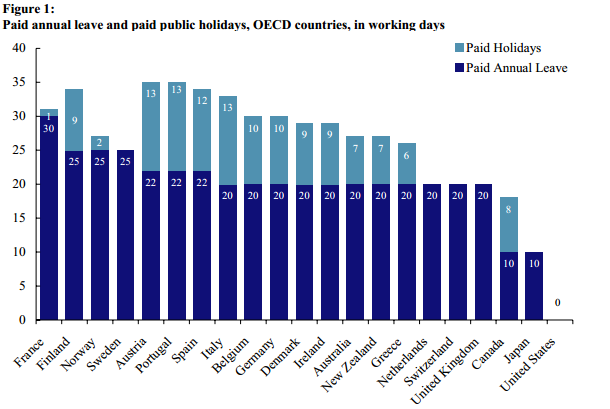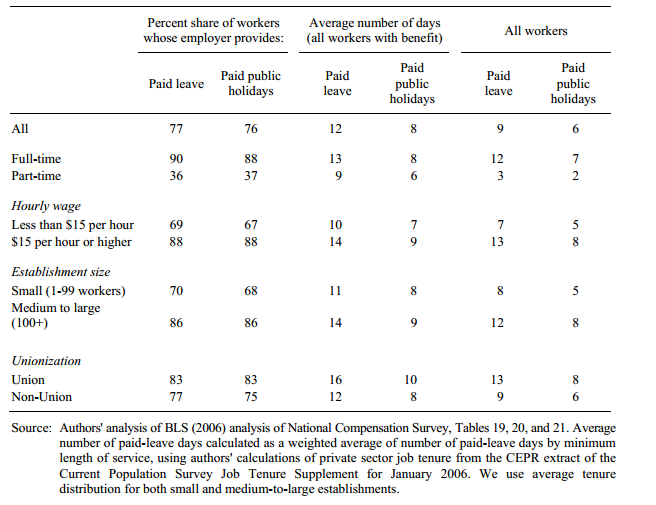
The United States is the only country among wealthy European, Asian and North American countries that doesn’t have a national minimum vacation requirement. France goes so far as to require a 30 day vacation minimum. When you combine leave with holidays, Portugal and Austria have 35 minimum days of paid vacation. The graph above and the graph below are both from a Harvard study on paid leave that is worth reading. Most working adults do have some paid leave but a significant proportion don’t have any at all. Additionally, many people have an absolute minimum:

The average amount of paid leave for all working adults is 12 days plus 8 public holidays. This means the average American has the same amount of leave as the minimum required in many other countries. Additionally, nearly a quarter of Americans have no paid leave or holidays. This burden falls disproportionately on those that make less money. Only about one-third of part time works have paid leave and only two-thirds of hourly workers making less than $15/hr have paid leave.
The Argument Against Paid Leave
The arguments against minimum vacation requirements are almost exactly the same as the arguments against paid sick leave and ultimately fall flat. Most of the criticisms of the paid sick leave ordinance revolved around increased business costs. As an example, John Schmidt who owns a few restaurants in Seattle (Eastlake Bar & Grill, Greenlake Bar & Grill, Lunchbox Laboratory) claimed that the paid sick leave law would increase his costs by $1,000 per employee. This opposition was somewhat predictable, coming from the Greater Seattle Chamber of Commerce and other business interest groups. To the credit of Seattle business owners, nearly 70% supported the law in a follow up study. Furthermore, these dire costs didn’t pan out. The worst thing that can be said of the law is that some business may have raised some of their prices a little. This evidence comes from an industry back study and is hardly an apocalyptic outcome and might not be true. If it is true though, it’s likely that passing on cost to consumers in order to benefit low wage works is exactly the progressive outcome Seattlites wanted. It is unlikely that the affects of a minimum paid leave law would be any different than paid sick leave.
Why Seattle? Why now?
It seems like Seattle has all the right prerequisites to pass a minimum vacation ordinance. After recently passing minimum wage and paid sick leave laws, there are established grassroots organizations and politicians that would be natural allies to this cause. Additionally, this would improve the working conditions for many people in the city. Lastly, like the minimum wage law, this would set a precedent for the nation and could be a jumping off point for a national campaign. If you agree with this you can contact city council and tell them you support a minimum paid leave law. Council Member Sawant might be the most receptive.
Also if you agree that Seattle should have a minimum vacation requirement, we encourage you to support a national minimum.

Owen Pickford
Owen is a solutions engineer for a software company. He has an amateur interest in urban policy, focusing on housing. His primary mode is a bicycle but isn't ashamed of riding down the hill and taking the bus back up. Feel free to tweet at him: @pickovven.


